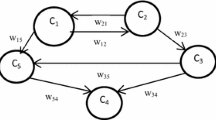Abstract
The aim of the present paper is to develop an integrated method that provide assistance to decision makers during system planning, design, operation and evaluation. In order to support the realization of Circular Economy (CE) it is essential to evaluate local needs and conditions that help to select the most appropriate system-components and resources needed. Each of these activities requires careful planning, however, the model of CE offers a comprehensive interdisciplinary framework. The aim of this research was to develop and to introduce a practical methodology for evaluation of local and regional opportunities to promote CE.
Access this chapter
Tax calculation will be finalised at checkout
Purchases are for personal use only
Similar content being viewed by others
References
Franklin-Johnson, E., Figge, F., Canning, L.: Resource duration as a managerial indicator for Circular Economy performance. J. Clean. Prod. 133(1), 589–598 (2016)
Hobson, K., Lynch, N.: Diversifying and de-growing the circular economy: radical social transformation in a resource-scarce world. In: Futures, vol. 82, pp. 15–25, September 2016
Witjes, S., Lozano, R.: Towards a more circular economy: proposing a framework linking sustainable public procurement and sustainable business models. In: Resources, Conservation and Recycling, vol. 112, pp. 37–44, September 2016
Lieder, M., Rashid, A.: Towards circular economy implementation: a comprehensive review in context of manufacturing industry. J. Clean. Prod. 115(1), 36–51 (2016)
Ghisellini, P., Cialani, C., Ulgiati, S.: A review on circular economy: the expected transition to a balanced interplay of environmental and economic systems. J. Clean. Prod. 114(15), 11–32 (2016)
Zadeh, L.A.: Fuzzy sets. Inf. Control 8(3), 338–353 (1955)
Axelrod, R.: Structure of Decision: The Cognitive Map of Political Elites. Princeton University Press (1975)
Kosko, B.: Fuzzy cognitive maps. Int. J. of Man-Mach. Stud. 24(1), 55–75 (1985)
Buruzs, A., Hatwágner, M.F., Torma, A., Kóczy, L.T.: Expert based system design for integrated waste management. Int. J. Environ. Ecol. Geol. Geophys. Eng. 8(12) (2014)
Buruzs, A., Hatwágner, M.F., Torma, A., Kóczy, L.T.: Retrospective reconstruction of time series data for integrated waste management. Int. J. Soc. Educ. Econ. Manag. Eng. 8(12) (2014)
Buruzs, A., Hatwágner, M.F., Kóczy, L.T.: Expert-based method of integrated waste management systems for developing fuzzy cognitive map. In: Taher, A.A., Quanmin, Z. (Eds.), Complex System Modelling and Control Through Intelligent Soft Computations. Springer International Publishing Switzerland, pp. 111–137. Studies in Fuzziness and Soft Computing, vol. 319 (2015)
Buruzs, A., Hatwágner, M.F., Földesi, P., Kóczy, L.T.: Fuzzy cognitive maps applied in integrated waste management systems. In: IEEE HNICEM-ISCIII. Paper 63. 4 p (2014)
Buruzs, A., Hatwágner, M.F., Kóczy, L.T.: Using fuzzy cognitive maps approach to identify integrated waste management system characteristics. In: Baranyi, P. (Ed.), 5th IEEE International Conference on Cognitive Infocommunications: CogInfoCom 2014, IEEE Hungary Section, pp. 141–147 (2014). ISBN:978-1-4799-7279-1
Hatwágner, F.M., Buruzs, A., Földesi, P., Kóczy, L.T.: A new state reduction approach for fuzzy cognitive map with case studies for waste management systems. In: Somnuk, P.A., Thien, W.A. (Eds.), Computational Intelligence in Information Systems: Proceeding of the Fourth INNS Symposia Series on Computational Intelligence in Information Systems (INNS-CIIS 2014). 362p. Springer International Publishing Switzerland, Cham, pp. 119–127 (2015). Advances in Intelligent Systems and Computing; 331 (2014). (ISBN:978-3-319-13152-8; 978-3-319-13153-5)
Papageorgiou, E.I., Hatwagner, M.F., Buruzs, A., Kóczy, L.T.: A concept reduction approach for fuzzy cognitive map models in decision making and management. submitted to J. Neurocomputing
Das, M., Chakraborty, M.K., Ghoshal, T.K.: Fuzzy tolerance relation, fuzzy tolerance space and basis. Fuzzy Sets Syst. 97(3), 361–369 (1998)
Klir, G.J., Folger, T.A.: Fuzzy Sets, Uncertainty and Information. Prentice Hall (1987)
Acknowledgements
The authors would like to thank to EFOP-3.6.1-16-2016-00017 1 ‘Internationalisation, initiatives to establish a new source of researchers and graduates, and development of knowledge and technological transfer as instruments of intelligent specialisations at Széchenyi István University’ and EFOP-3.6.2-16-2017-00015 “HU- MATHS – IN – Intensification of the activity of the Hungarian Industrial Innovation Service Network’for the support of the research.
Author information
Authors and Affiliations
Corresponding author
Editor information
Editors and Affiliations
Rights and permissions
Copyright information
© 2019 Springer Nature Switzerland AG
About this chapter
Cite this chapter
Buruzs, A., Hatwágner, M.F., Kóczy, L.T. (2019). Reduced Model Investigations Supported by Fuzzy Cognitive Map to Foster Circular Economy. In: Cornejo, M., Kóczy, L., Medina, J., De Barros Ruano, A. (eds) Trends in Mathematics and Computational Intelligence. Studies in Computational Intelligence, vol 796. Springer, Cham. https://doi.org/10.1007/978-3-030-00485-9_22
Download citation
DOI: https://doi.org/10.1007/978-3-030-00485-9_22
Published:
Publisher Name: Springer, Cham
Print ISBN: 978-3-030-00484-2
Online ISBN: 978-3-030-00485-9
eBook Packages: Intelligent Technologies and RoboticsIntelligent Technologies and Robotics (R0)




